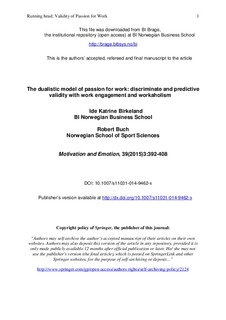The dualistic model of passion for work: discriminate and predictive validity with work engagement and workaholism
Journal article, Peer reviewed
Permanent lenke
http://hdl.handle.net/11250/297217Utgivelsesdato
2015Metadata
Vis full innførselSamlinger
- Scientific articles [2181]
Sammendrag
The purpose of this paper was to investigate the discriminant and predictive validity of the dualistic model of passion for work. Harmonious and obsessive passion was compared to work engagement and workaholism in two studies. Study 1 was cross-sectional and supported convergent and discriminant validity of the dualistic model using exploratory structural equation modeling (ESEM) and confirmatory factor analysis. Study 2 was cross-lagged and applied confirmatory factor analyses, as well as hierarchical linear modeling to test discriminant, convergent, and predictive validity of harmonious and obsessive passion for work. Predictive validity was supported for obsessive and harmonious passion with respect to wellbeing, but not with respect to performance. When controlling for work engagement and workaholism, harmonious passion was negatively related to burnout and positively related to life satisfaction. In contrast, obsessive passion related positively to burnout and negatively to life satisfaction. Only workaholism predicted variance in supervisor rated organizational citizenship behaviors (negatively related), and none of the included variables were associated with supervisor rated in-role performance.
Beskrivelse
This is the authors’ accepted, refereed and final manuscript to the article
